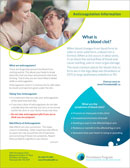Treatment
Blood clots are treated with anticoagulants, also known as blood thinners. Anticoagulants are used to prevent blood clots and allow your body to more quickly break down any existing clots.
There are three types of anticoagulant medications used to treat thrombosis: low molecular weight heparin (LMWH), Warfarin and direct oral anticoagulants (DOACs). The treatment approach is the same for both DVT and PE. In extreme cases, a thrombolytic therapy is given to the patient in an intensive care setting to break down clots more aggressively.
For more information, please download the anticoagulation brochure here:
Details about each medication are described in the page links below. Brochures are available on the Resources page.
- Low molecular weight heparin (LMWH)
- Warfarin
- Direct oral anticoagulants (DOACs)
- Thrombolytic Therapy
Because anticoagulants prevent your blood from clotting quickly, when you are taking this medication your risk of bleeding is higher. When you are taking anticoagulants you should avoid:
- Aspirin (unless instructed by a doctor)
- Ibuprofen and other non-steroidal anti-inflammatory drug (NSAIDS)
- Intramuscular injections
- Contact sports or activities that can lead to serious injury
- Binge or excessive drinking (more than 2 drinks a day)
- Smoking
Contact the Thrombosis Clinic or your doctor if:
- You experience any abnormal bleeding or large bruises
- You are booked to have surgery
- You are having any procedure that can cause bleeding
- You are booked to have dental work other than cleaning
- You have acute illness with diarrhea or vomiting
- There is any change in your medications
Call your doctor urgently or go to an emergency room if you:
- Have bright red blood in your stool, urine or vomit
- Have black, tarry, foul smelling stools
- Have sudden onset of a new, severe headache, especially if you are nauseated or drowsy
- Injured your head (even if minor) or have had a bad fall
- Experience swelling and severe pain in a joint
- Have unexplained shortness of breath
- Have worsening pain and swelling in legs or arms
- Have new and severe chest pain
- Feel your heart is racing, especially if you are dizzy
Anticoagulation Information Sheet
Click image to view PDF.
To lower your risk of having more clots:
- Exercise regularly
- Maintain a healthy body weight
- Avoid sitting or lying in bed for long periods of time
- Sit with both legs on the floor (uncrossed)
- Maintain balance between activity and rest
- Keep a healthy, regular and stable dietary intake
- Stay hydrated - drink plenty of water everyday


